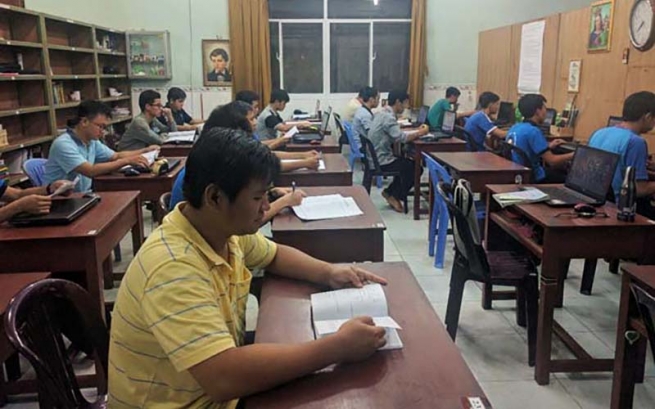VIETNAM: Salesian universities prepare youth for the workforce and religious life as lay teachers and priests

(MissionNewswire) Salesian missionaries operate universities in both Ho Chi Minh City (commonly known as Saigon) and in Dalat, Vietnam that educate youth from all over the country. The universities provide vocational and technical education as well as help youth learn how to live on their own for the first time.
Salesian students typically organize themselves into small groups of 10 to 30 students to look for places to rent in the two cities. They often find places that are owned by Salesian parishioners. The spaces are small, usually only accommodating bunk beds and a small kitchen, living room and study space.
Once an apartment has been secured, Salesian missionaries help to prepare students for living on their own. They assist in setting schedules, buying provisions, cooking, cleaning and finding a balance between school and life. Sharing space and learning how to live on a budget helps students to spend less, ensuring that even students from poor backgrounds are able to afford university studies.
There are Salesian Youth Centers in both Ho Chi Minh City and Dalat which are often the first places youth connect with Salesian missionaries before attending university. At the centers, missionaries meet with youth to understand their needs, skill sets and level of commitment to attend and succeed at university.
Not all students who attend Salesian universities are Catholic. Vietnam is home to close to 100 million people with only 7 percent of them being Catholic. Salesian missionaries offer one program for both Catholic and non-Catholic students which includes academic courses as well as those that help students grow in tolerance, mutual knowledge and respect and inter-religious dialogue.
A second program is for young male Catholics who are interested in strengthening their faith and preparing themselves for a life of intense Christian commitment and religious life in the Catholic church. This year in Dalat, close to 200 students are enrolled in the first program and 50 are enrolled in the second.
“Most of the students who pass through this kind of experience are very committed not only in their professional field, but also in society,” says Father Joseph Phuoc, a Salesian missionary in Dalat. “Among the Catholics who followed the second vocational path, many have become lay leaders in their Christian communities, several joined the diocese as priests and a few are now members of various religious congregations including the Salesians of Don Bosco.”
According to the World Bank, close to 14 percent of Vietnam’s population lives in conditions of poverty. The country has seen a drastic reduction of poverty over the last 20 years when the poverty rate was close to 60 percent. Vietnam has also made remarkable progress in education. Primary and secondary enrollments for those in poverty have reached more than 90 percent and 70 percent respectively. Rising levels of education and diversification into off-farm activities such as working in construction, factories or domestic housework, have also contributed to reducing poverty in the country.
Salesian Missions gives impoverished children and families opportunities that are typically only available to the middle and upper classes—so that all people can have hope for a better future.
###
Sources:
ANS Photo (usage permissions and guidelines must be requested from ANS)
ANS – Vietnam – Vocational animation of university students
World Bank – Vietnam




